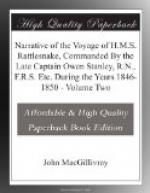(Footnote. It is but justice to state here that the English invention of preserving meat in air-tight canisters had only recently been attempted in Sydney; and it was then to be regarded merely as an experiment to try whether a new and important article of colonial export could not be produced. Since then, further experience in the process has enabled the introducers of the plan to succeed so perfectly, that afterwards, the colonial preserved meats supplied to the Rattlesnake, including some which had been kept for eighteen months, were always preferred by us to those prepared in England. The meat itself, I allude to beef and mutton, was of better quality, and the cost much less.)
CAPE UPSTART.
May 19th.
At length, after several days of light and contrary winds, the wind came round to South-East and assumed the appearance of the trade, which we had at last picked up. We ran round the north-east end of the Cumberland Islands, passed Cape Gloucester, and in the evening anchored under Cape Upstart in our former berth.
During a solitary ramble next day, chiefly in order to search for a kind of rock wallaby, or small kangaroo, peculiar to this place, and which I failed on this occasion (as during two previous visits) to procure, I walked as far as the place where the Fly had watered some years previously. The large rocky basin which we had found dry in December last, when the whole plan of our first northern cruise had to be altered, in consequence of this unexpected result, was now nearly full. The aspect of the country had been considerably changed by the late abundant fall of rain, and the vegetation everywhere looked quite green. No signs of natives were seen—their visits to the immediate vicinity of the Cape appear to be made only at rare intervals; and the just chastisement bestowed upon them some years ago, in consequence of a wanton attack made upon a seining party will, probably, for some time to come, render them cautious of coming in contact with white men. While wading about among the tall grass, the long sharp awns of the prevailing kind, an Anthistiria, were more annoying than can be described, having forced their way in hundreds through my thin clothing, causing an annoying and painful irritation; to which, the bites of clouds of mosquitoes in a mangrove swamp which I had entered in chase of some bowerbirds, added a finishing touch, as if to test the powers of human endurance. Having expended my stock of dust shot, I tried fine sand—which I had somewhere read of as a substitute, but, although used under the most favourable conditions, the experiment proved a complete failure. Sights for rating the chronometers to get which was the only object in coming here, having been obtained, we left for Goold Island in the afternoon.
GOOLD ISLAND.
May 21st.




